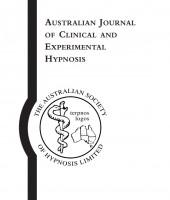Jason O’Callaghan of The D4 Clinic (as seen on RTE/ITV/Virgin media/TG4)
2 day Introduction to both clinical and stage Hypnosis in Dublin
Cost €497
Awarded by
WhatClinic.com
Hypnosis has proven to be extremely valuable in the treatment of cancer patients. Specific applications include: establishing rapport between the patient and members of the medical health team; control of pain with self-regulation of pain perception through the use of glove anesthesia, time distortion, amnesia, transference of pain to a different body part, or dissociation of painful part from the rest of the body; controlling symptoms, such as, nausea, anticipatory emesis, learned food aversions, etc.; Psychotherapy for anxiety, depression, guilt, anger, hostility, frustration, isolation, and a diminished sense of self-esteem; visualisation for health improvement; and dealing with death anxiety and other related issues. Hypnosis has unique advantages for patients including improvement of self-esteem, involvement in self-care, return of locus and control, lack of unpleasant side effects, and continued efficacy despite continued use.
Self-defeating eating has negative effects on the lives of a large number of people in western world. In Australia, obesity and overweight is on the rise, affecting twenty-five percent of children, and between thirty and fifty percent of adults. Both dietary restriction and over-indulgence in high fat, calorie laden foods with little nutrient value have a large negative impact on health of at least one half of the western world. Treatment options are inadequate, in terms of availability and efficacy. Of the programs currently available, cognitive behavioural techniques have the best empirical record and it appears that hypnosis may prove a useful adjunct to the treatment program.
 Corporate Wellness Center
Corporate Wellness Center
 This case study describes the use of hypnosis in the treatment of post-traumatic stress disorder, resulting from exposure to wartime atrocities and social media events. It demonstrates the effectiveness of hypnosis as an adjunct to cognitive–behavioural therapy in the management of a patient who was proving to be resistant to treatment. Therapy was aimed at stress management, trauma focus, relapse prevention and maintenance, with the client reporting improvement within seven sessions.
This case study describes the use of hypnosis in the treatment of post-traumatic stress disorder, resulting from exposure to wartime atrocities and social media events. It demonstrates the effectiveness of hypnosis as an adjunct to cognitive–behavioural therapy in the management of a patient who was proving to be resistant to treatment. Therapy was aimed at stress management, trauma focus, relapse prevention and maintenance, with the client reporting improvement within seven sessions.
Read More Here
 The following case demonstrates how hypnosis can be used as an adjunct in the treatment of a stress-influenced physical spasm of the cricopharyngeal muscle. Hypnosis was used first to explore precipitating contextual events related to the spasm and second to induce a relaxation response and related soothing of the spasm-prone muscle when tense . This provided a sense of control and mastery for the patient and insight was gained into the circumstances surrounding the muscle spasm.
The following case demonstrates how hypnosis can be used as an adjunct in the treatment of a stress-influenced physical spasm of the cricopharyngeal muscle. Hypnosis was used first to explore precipitating contextual events related to the spasm and second to induce a relaxation response and related soothing of the spasm-prone muscle when tense . This provided a sense of control and mastery for the patient and insight was gained into the circumstances surrounding the muscle spasm.
Self-defeating thoughts which increased the stress and anxiety the patient experienced were explored and related to the cricopharyngeal spasm through cognitive–behavioural therapy. Alternative ways of managing stress and anxiety were addressed and encouragement to use social support actively provided. Treatment resulted in a decrease in voiced discomfort and occurrence of cricopharyngeal spasm making hypnosis an easy adjunctive treatment to swallow.
Read More Here
 When cancer clients/patients come into our consulting rooms they may expect miracles from hypnosis . Hypnosis is not magic, but its positive effects may sometimes seem nothing short of miraculous for the cancer client/patient in the way that it can help the patient cope with the diagnosis and treatment of cancer, and increase their self-efficacy. This paper will outline the use of psychological intervention and more specifically hypnosis with cancer clients/patients.
When cancer clients/patients come into our consulting rooms they may expect miracles from hypnosis . Hypnosis is not magic, but its positive effects may sometimes seem nothing short of miraculous for the cancer client/patient in the way that it can help the patient cope with the diagnosis and treatment of cancer, and increase their self-efficacy. This paper will outline the use of psychological intervention and more specifically hypnosis with cancer clients/patients.
It is based on the workshop presented at the Australian Society of Hypnosis Congress in 2012 on Daydream Island. The workshop was divided into two parts. The first part was presented by Dr Norman Shum and discussed Zen Buddhism and meditation, and how meditation fits within Buddhist philosophy . It also included some aspects of psychological intervention, such as pain control, which for brevity purposes was included in this section . The second part focused exclusively on cancer and the use of hypnosis with cancer clients/patients, and was presented by Dr Sue Stefanovic.
Read More Here
The clinic operates strictly by appointment only
Disclaimer: Hypnosis is a therapy and like all therapies, results will vary from one person to the next